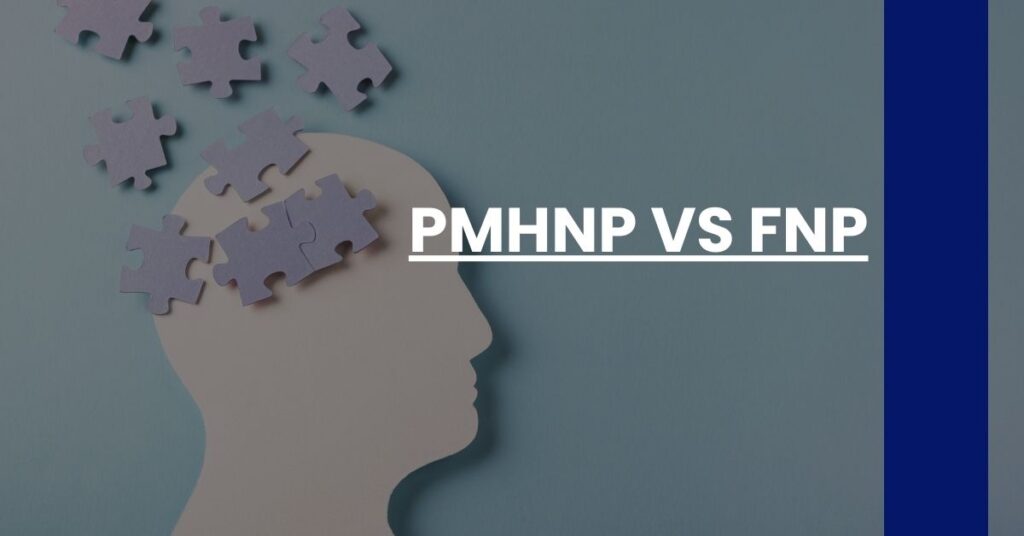The decision between pursuing a career as a Psychiatric Mental Health Nurse Practitioner (PMHNP) or a Family Nurse Practitioner (FNP) hinges on your interest in behavioral health versus a broader primary care role.
PMHNPs specialize in mental health, offering therapies and medications to those with psychiatric disorders, while FNPs provide more generalized family-oriented care from infancy through adulthood, addressing a wide range of health issues.
In short:
- PMHNP: Focus on mental health, psychiatric evaluation, and therapy.
- FNP: Broad primary care across the patient’s lifespan.
Choosing the right path rests on your personal passion for mental health or comprehensive family care.
- Understanding the PMHNP Role
- Exploring the FNP Role
- Educational Pathways for PMHNPs and FNPs
- Certification and Licensure for PMHNPs and FNPs
- Work Environments and Scheduling
- Job Outlook and Career Opportunities
- Salary Comparisons: PMHNP vs. FNP
- Making the Decision: Is PMHNP or FNP Right for You?
- Conclusion: Choosing Your Path in Nursing
Understanding the PMHNP Role
If you’re intrigued by the human mind and have a deep passion for mental health, becoming a Psychiatric Mental Health Nurse Practitioner (PMHNP) might be your calling. PMHNPs play a vital role in the healthcare system, providing comprehensive mental health care to patients suffering from psychiatric disorders, emotional problems, and substance abuse issues.
As a PMHNP, your day-to-day duties would vary widely, but largely focus on the assessment, diagnosis, and treatment of mental health conditions. You’d be tasked with creating holistic care plans that not only address the psychological aspects of health but also consider the physical and social factors contributing to the patient’s well-being. In addition, prescribing medication, providing psychotherapy, and offering crisis intervention services may fall within your jurisdiction.
To give you a clearer picture, here’s what being a PMHNP could look like for you:
- Assessment and Diagnosis: Thoroughly evaluating patients’ mental health, identifying disorders, and pinpointing potential underlying causes.
- Treatment Planning: Crafting personalized care strategies that may include therapy, medication, or a combination of treatments.
- Psychotherapy: Acting as a therapist to help patients navigate complex emotional or behavioral issues.
- Medication Management: Prescribing psychotropic medications and managing their effects and efficacy.
- Patient Education: Informing patients and their families about mental health conditions and treatment plans.
- Interdisciplinary Collaboration: Working alongside psychologists, psychiatrists, social workers, and other healthcare professionals.
This challenging yet highly rewarding path leans heavily into the psychological side of healthcare, marrying clinical expertise with compassionate care. Duquesne University provides more insights on what it takes to step into this unique nursing role.
Exploring the FNP Role
Picture yourself in a bustling family practice: you’re caring for patients of all ages, managing chronic diseases, providing preventive care, and handling everything from the common cold to complex health issues—that’s the life of a Family Nurse Practitioner (FNP). FNPs are the multi-tool of the nursing world, equipped to provide a wide spectrum of healthcare services across the lifespan.
Embracing the full breadth of general medicine, some of your responsibilities would include:
- Preventive Care: Guiding patients in health maintenance and disease prevention.
- Chronic Disease Management: Overseeing long-term care plans for conditions like diabetes or hypertension.
- Wellness Checkups: Conducting physical exams and routine health evaluations.
- Urgent Care: Addressing acute illnesses and injuries.
- Patient Advocacy: Acting as a liaison between patients and other healthcare providers.
- Health Education: Empowering patients with the knowledge to make informed health decisions.
In a way, you’re like the healthcare quarterback for families, often serving as their first point of contact within the healthcare system. Through building long-term relationships, you’re able to see the impact of your care over time. Discover more about the diverse role of an FNP at Duquesne University’s dedicated overview.
Educational Pathways for PMHNPs and FNPs
Your journey to becoming a PMHNP or FNP starts with education. Both roles require obtaining an advanced degree—either a Master of Science in Nursing (MSN) or a Doctor of Nursing Practice (DNP)—with specialized coursework that sets you up for success in your chosen field.
For the PMHNP track, your curriculum will center on topics tailored to mental health. Courses on psychopharmacology, psychotherapy techniques, and advanced psychiatric assessment are critical components that equip you with the expertise needed for psychiatric care. You’ll delve into the complexities of the brain, learning to decipher the nuances of mental wellness and illness.
Alternatively, if the FNP path is more appealing, expect a broad spectrum of primary care-focused studies. You’ll cover the lifecycle from pediatric to geriatric care, mastering how to diagnose and treat a wide array of diseases. The emphasis is on comprehensive healthcare, with a curriculum that prepares you to be as versatile as the role demands.
In both educational paths, clinical experiences are integral. They provide real-world applications of your coursework, ensuring that you’re not just book-smart but also adept at translating your knowledge into effective patient care. If you’re considering the path to becoming a PMHNP or FNP, Bradley University sheds light on what your educational journey might entail.
Certification and Licensure for PMHNPs and FNPs
Earning your degree is only part of the journey towards becoming a PMHNP or FNP. Achieving certification and state licensure is your next milestone, and it signifies your readiness to provide top-notch care within your specialty.
If you decide to go the PMHNP route, you’ll need to pass a certification exam such as the ANCC’s Psychiatric-Mental Health Nurse Practitioner board certification. It’s a comprehensive test that evaluates your knowledge and skills in psychiatric care. Maintaining your certification involves meeting continued education requirements and possibly engaging in clinical practice hours. Your journey doesn’t end with passing the test, as most states also require a distinct APRN license to practice.
As for FNPs, the process is quite similar: you’ll take a board-approved certification exam, like the FNP-BC, that assesses your understanding of family medicine. Alongside this, you must maintain an active RN license and fulfill your state’s renewal requirements, which often include continued education and clinical practice hours.
The licensure process ensures you’ve got the chops to handle the responsibilities entrusted to advanced practice nurses. Whether you’re leaning towards the psychological intricacies of a PMHNP or the broad scope of an FNP, licensure is your rite of passage into professional practice. To grasp the specifics of these certification processes, check out the resources from the American Nurses Credentialing Center for PMHNPs and the licensure guide for FNPs at [Nursing License Map](https://nursinglicensemap.com/advanced-practice-nursing/nurse-p ractitioner/psychiatric-and-mental-health-nurse-practitioner-pmhnp/).
Work Environments and Scheduling
The decision between a career as a PMHNP or an FNP is not just about the nature of the work, but also where you’ll be doing it and what your day might look like.
As a PMHNP, you could find yourself in a variety of settings tailored to mental health care, such as outpatient mental health clinics, psychiatric hospitals, or private practices. Your schedule might involve regular business hours if you’re in private practice, or it could include shifts at a hospital. You might also have the opportunity to provide telepsychiatry services, particularly in underserved areas. Explore the different environments where a PMHNP could thrive at Duquesne University.
Alternatively, as an FNP, you can expect to work in a wide range of healthcare settings. This includes family practices, urgent care clinics, schools, or even patient homes for those who specialize in home health care. FNPs often enjoy a traditional five-day workweek, but depending on the practice setup and patient needs, you may also find yourself working evenings or weekends.
Understanding the dynamics of each setting can give you better insight into what might suit your lifestyle best. As you consider the “pmhnp vs fnp” debate, think about where you see yourself making the most impact and the type of work-life balance you desire.
Job Outlook and Career Opportunities
Whether you choose the PMHNP or FNP path, you’re entering a field with a robust job outlook and ample career opportunities. Demand for nurse practitioners is on the rise, and it’s not slowing down anytime soon. The Bureau of Labor Statistics predicts a 45% growth in the employment of nurse practitioners from 2020 to 2030, much faster than the average for all occupations.
Specifically, as a PMHNP, you’ll be at the forefront of addressing the critical shortage in mental health services. With the increasing awareness of mental health’s importance, your skills will be in high demand. This need is especially acute in rural and underserved areas, where access to mental health professionals is often limited.
If you lean towards family practice as an FNP, you’ll find that your services are equally essential. FNPs often fill the gap in primary care, especially in regions with a scarce supply of family physicians. Both roles not only promise job security but also the potential for growth and the flexibility to switch practice settings if desired.
For a deeper dive into what the job market looks like for PMHNPs and FNPs, you can find valuable information at Regis College.
Salary Comparisons: PMHNP vs. FNP
When it comes to salary, both PMHNPs and FNPs are well-compensated for their expertise, though there are variations depending on geographic location, experience, and the setting in which you work.
PMHNPs generally have average salaries ranging from about $113,100 to $137,000 annually, with higher earning potential in settings that are highly specialized or underserved. Your expertise in mental health can lead to higher pay scales, especially as the demand for mental health services increases.
On the other hand, FNPs can expect salaries in the range of approximately $112,186 to $131,340. The extensive scope of practice and the ability to work in various healthcare environments contribute to this range, with experienced FNPs potentially earning more in leadership roles or specialized areas within family practice.
Regardless of the path you choose, your compensation will reflect the critical nature of the work you do. For more details on what you might expect to earn in each role, check salary benchmarks at Salary.com for FNPs and at Nurse.org for insights into PMHNP salaries.
Making the Decision: Is PMHNP or FNP Right for You?
Reflect on your passion and where you see yourself excelling—mental health care or broader family-oriented practice. Consider the fulfillment you could gain from either supporting a patient overcome psychological challenges as a PMHNP or assisting individuals and families navigate their health throughout their lives as an FNP.
It’s also essential to think about your strengths and interests. Are you particularly empathetic and drawn to the complexities of mental health? Or do you find satisfaction in dealing with a mix of health issues and ages, thriving on variety?
Both paths call for dedication and a commitment to lifelong learning. Given the ever-evolving nature of healthcare, being flexible, adaptable, and continuously open to growing professionally will serve you well in either specialty. Bradly University’s FNP vs. PMHNP overview can offer additional insight into personal considerations for your career choice.
Conclusion: Choosing Your Path in Nursing
In closing, while pondering “pmhnp vs fnp,” remember that both PMHNPs and FNPs play a crucial role in advancing the health and well-being of their communities. Your decision will profoundly influence your professional trajectory and your personal satisfaction in your nursing career. Reflect on the differences and similarities, consider where your passion lies, and weigh the lifestyle implications of each role.
Whatever path you choose, know that your skills will be in high demand and that you have the opportunity to make a significant impact on the lives of your patients. With the knowledge you’ve gained here, you’re now equipped with a foundational understanding to help guide your decision—and embark on a rewarding journey in the field of nursing.

